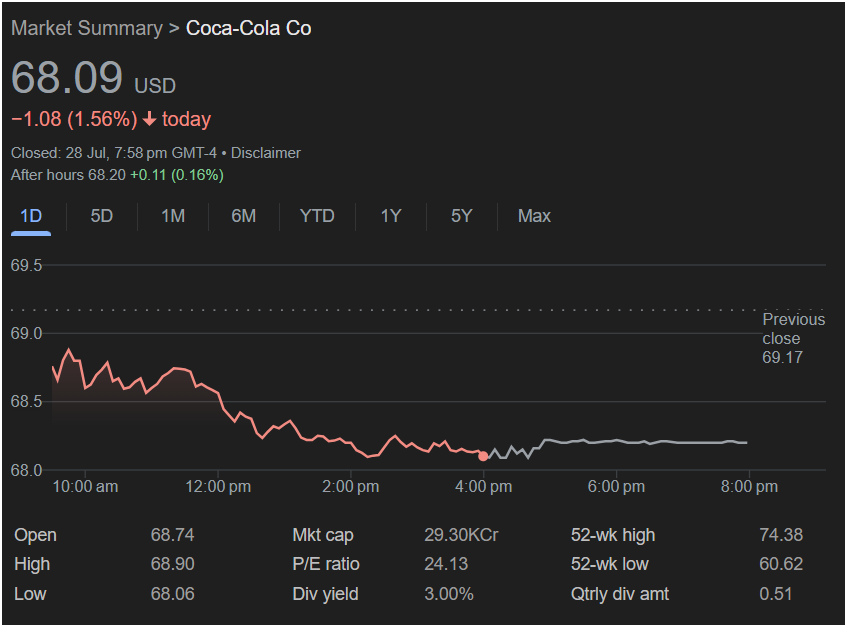Coca-Cola Stock Slides 1.5% as Recession Fears Grip Wall Street; Investors Weigh Defensive Appeal

NEW YORK – Shares of The Coca-Cola Company (NYSE: KO), the iconic beverage maker and a staple in portfolios worldwide, experienced a significant downturn on Thursday, reflecting broader market anxiety after new data signaled the U.S. economy has entered a technical recession. The stock closed the official trading session down 1.56%, shedding $1.08 to land at $68.09 per share.
The decline came on a day of heightened volatility across the market, as investors grappled with the implications of two consecutive quarters of negative GDP growth. Despite the intraday sell-off, a modest recovery in after-hours trading, where the stock edged up 0.16% to $68.20, suggested that some investors may be viewing the dip as a chance to buy into the blue-chip stalwart at a discount.
 A Day of Downward Pressure
A Day of Downward Pressure
The trading day for Coca-Cola began with a sense of unease. The stock opened at $68.74, already below the previous day’s close of $69.17. It briefly touched a high of $68.90 in the opening hour before a steady wave of selling pressure dragged it downward for the majority of the session. The downward momentum intensified around midday, pushing the shares to their lowest point of the day at $68.06. The stock hovered near this low for the remainder of the afternoon before closing just a few cents higher.
This price action places Coca-Cola shares firmly in the middle of their 52-week range, which spans from a low of $60.62 to a high of $74.38. While the stock remains well off its yearly peak, the day’s drop represents a notable pullback for a company typically seen as a bastion of stability.
Macroeconomic Headwinds Buffet a Market Leader
The sell-off in Coca-Cola was not an isolated event but rather a symptom of a market-wide reaction to troubling economic news. The Commerce Department’s report on Thursday, July 28, confirmed that the U.S. Gross Domestic Product (GDP) fell at a 0.9% annualized rate in the second quarter. This followed a 1.6% decline in the first quarter, meeting the common definition of a recession and spooking investors across all sectors.
This news came just one day after the Federal Reserve announced another aggressive interest rate hike of 75 basis points in its ongoing battle against decades-high inflation. The combination of slowing economic growth and tightening monetary policy has created a challenging environment, forcing investors to reassess the value and future earnings potential of even the most established companies. For consumer-facing businesses like Coca-Cola, the primary concern is whether persistent inflation and a potential recession will eventually force households to cut back on spending, even on small, everyday purchases.
A Look at the Underlying Fundamentals
Despite the daily price drop, a closer look at Coca-Cola’s financial metrics reveals why it has long been a favorite among long-term and income-focused investors. With a market capitalization in the realm of $293 billion, its massive scale provides a significant competitive moat.
One of its most attractive features is its dividend. The company boasts a robust dividend yield of 3.00%, a key reason for its status as a “Dividend Aristocrat”—a title reserved for S&P 500 companies that have increased their dividends for at least 25 consecutive years. In an environment of market uncertainty and high inflation, such a reliable income stream can be highly appealing, providing a cushion against price declines.
Furthermore, the stock’s Price-to-Earnings (P/E) ratio stood at 24.13. While not considered a “value” stock by traditional metrics, this premium valuation suggests that the market is willing to pay more for Coca-Cola’s predictable earnings, immense brand loyalty, and global reach. It reflects confidence in the company’s ability to navigate economic storms better than most.
The Defensive Stock Dilemma
Historically, consumer staples companies like Coca-Cola are considered “defensive” plays. The theory is that people will continue to buy their products—be it a can of Coke, a Diet Coke, or a Dasani water—regardless of the broader economic climate. This resilience often allows them to outperform the general market during downturns.
Thursday’s price action, however, shows that even the strongest defensive names are not immune to sharp, sentiment-driven market sell-offs. The broad-based flight from equities in response to the recession data appeared to overwhelm the stock’s traditional safe-haven appeal, at least temporarily.
The key question for investors now is whether this dip represents a fundamental crack in the defensive thesis or simply a knee-jerk reaction that creates a more attractive entry point. As the market continues to digest the Federal Reserve’s policy path and the reality of a slowing economy, the performance of bellwethers like Coca-Cola will be watched closely as a gauge of both consumer health and overall investor confidence. The slight uptick in after-hours trading could be the first signal that bargain hunters are already stepping in, betting on the company’s long-term strength over short-term market fears.
